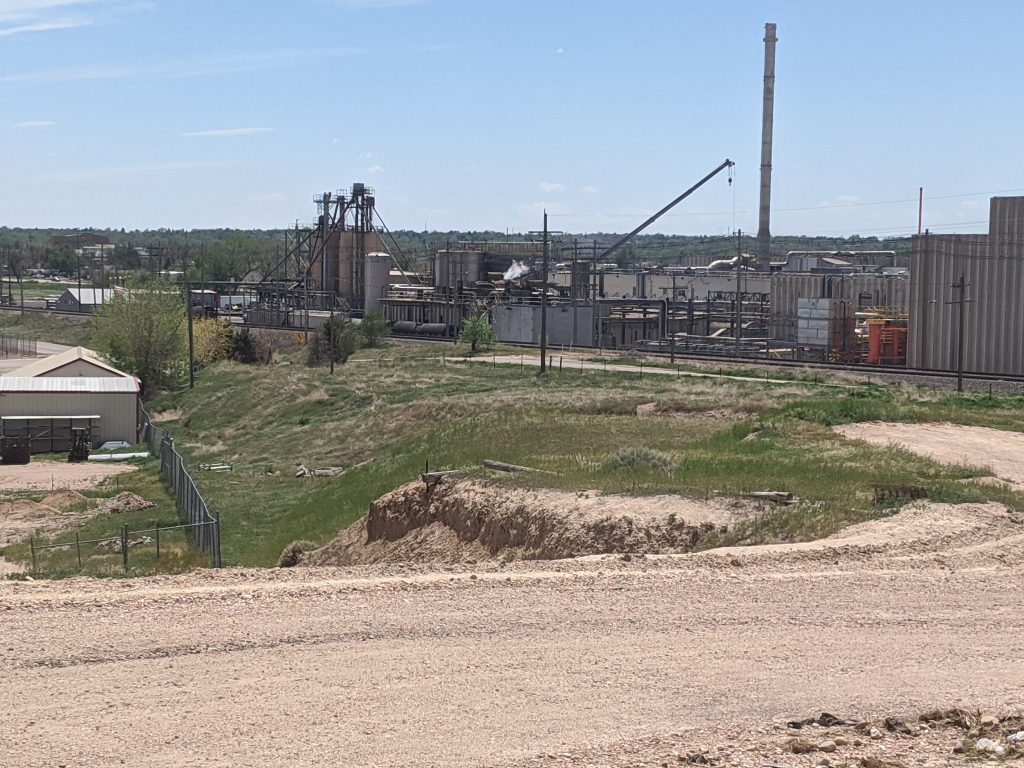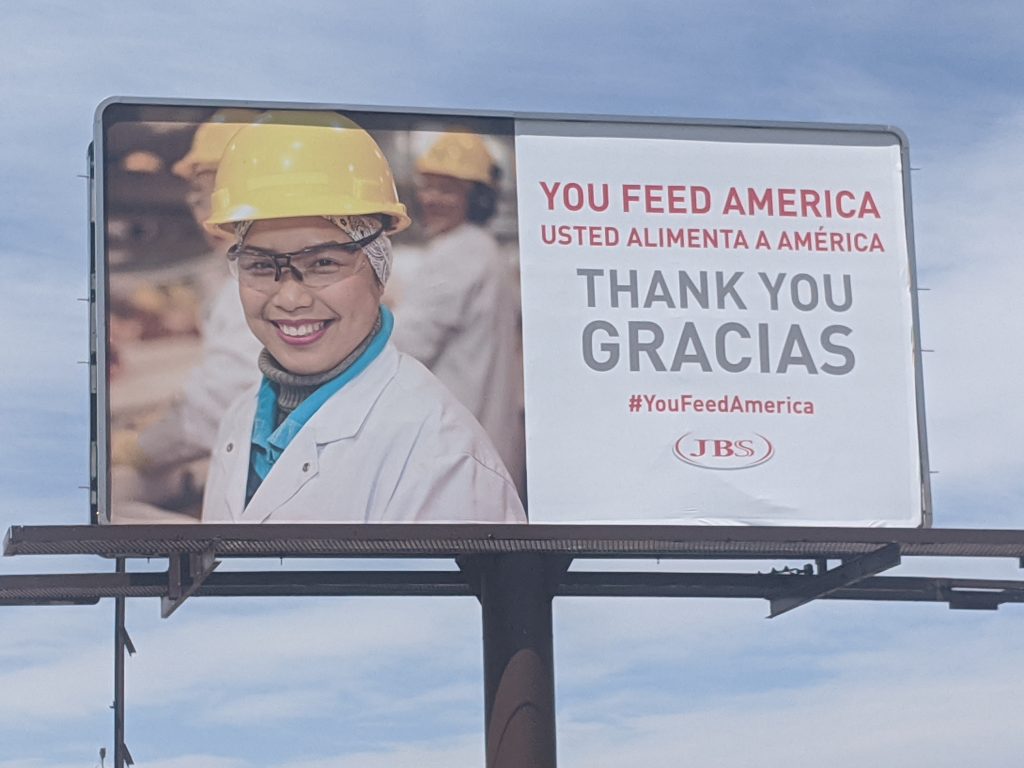Semi-trucks lined up outside the JBS Swift meatpacking plant in Greeley to pick up beef on Wednesday, giving the optics of business as usual.
But the plant, just like the rest of the world, is embroiled in a pandemic – a fact laid bare by the eighth COVID-19 death of a worker from that facility this weekend.
“For those who are there, there’s a pretty good group of workers that are scared to be back to work,” said Kim Cordova, the president of United Food and Commercial Workers (UFCW) Local 7, a union with full-time representatives monitoring JBS from within the Greeley facility. “They know that their co-workers have died.”
Tin Aye, a refugee from Burma and a member of UFCW Local 7 who bagged pig tails at JBS, passed away on Sunday from COVID-19.
According to a report by the Daily Beast, when Aye first noticed her symptoms, she went to the plant’s on-site clinic. There, she was told she had a common cold and should return to work.

But just weeks later, Aye tested positive for the virus and was admitted to the hospital. She died this weekend unable to move or speak after having been on a ventilator for a month.
Like many of the other workers who died at the plant, Aye was a member UFCW Local 7.
“It’s hard to tell if anyone has COVID because they’re not doing daily testing or on-site testing,” Cordova said. “Until we have a vaccine for this virus, these workers are still threatened.”
Meatpacking Plant’s Response
“We do not want sick team members coming to work,” said Nikki Richardson, a corporate communications representative for JBS. “No one is forced to come to work and no one is punished for being absent for health reasons.”
She said the company offers “unpaid leave without any consequence to their employment” to those JBS laborers “fearful of coming to work.”
But Cordova said JBS still has a work-while-sick culture.
“A big problem with all of that is that they don’t offer full paid sick days,” she said. In order to receive sick pay, a worker must “have COVID-like symptoms or test positive. If they do, they get disability pay in some cases, which is a lot less than their full pay.”
“If they don’t get the full pay,” Cordova said, “then people have to make a decision between economic devastation and coming to work sick.”
Richardson said those who do come in receive “an Essential Team Member Bonus of $600 that was paid last week,” and “an additional $4 per hour bonus for all hourly team members to be paid through May 30.”

But Cordova said this policy also appears more generous than it really is.
“We’re not thrilled about bonuses,” she said. “We think hourly hazard compensation is better for workers because” bonuses are “like a carrot.”
Cordova said workers were only eligible for the bonus after working under extra hazardous pandemic conditions for several weeks. She also pointed out that working as a JBS meatpacker is already a dangerous, sometimes fatal occupation in the best of times.
“This is a hazardous job, so that $4/hour needs to continue for the entire time that workers clock in. They need to have pay that reflects the hourly hazards they have,” Cordova said.
Workers, who were instructed to not answer questions from reporters, were seen at the plant Thursday with face masks or visors.
But Cordova said this was not the “highest level” of personal protective equipment.
“There’s still areas within the plant where there’s just no room for social distancing,” she said.
Federal Impositions
“We will not operate a facility if we don’t believe it’s safe,” Richardson said.
But really, whether an American JBS plant will remain open is not up to JBS.
Late last month, Pres. Donald Trump invoked the Defense Production Act to force meatpackers to stay open regardless of the risk to workers.
“The action taken by the Administration recognizes the important role food companies serve and helps to ensure that our food supply will remain resilient during these unprecedented times,” Richardson said. This “will help keep food on tables through the essential work of our team members… and the entire food supply chain.”
But Cordova was nervous about the move.
“There are no enforceable laws,” Cordova said. “We’re really worried that with the president’s executive order, they provided liability shields for negligence where workers can’t sue. Then, they’ll be no incentive for companies to have a safe workplace.”
The union posted a letter to the Trump administration on its website signed by Rep. Diana DeGette (D-CO) expressing “extreme concern… for the implications this might have for the health and safety of the workers in these plants during the ongoing pandemic.”
In particular, the letter singled out the Trump administration’s lack of clarity surrounding worker safety in invoking the act.
“How will the CDC and OSHA ensure that meatpackers are abiding by existing and any future guidance?” and “How will social distancing be applied and enforced on production lines?” were among the questions the letter posed.
Social Distancing
“Educating and encouraging team members to practice social distancing at home and in the community outside of work,” is important to JBS, Richardson said.
But at nearby stores serving the plant’s workers, masks seemed optional despite Gov. Jared Polis’ order requiring face coverings in essential businesses.
The protocol is not stringently enforced in Greeley, which is possibly a result of Weld County Sheriff Steve Reams’ public indifference toward federal guidelines on face coverings.
JBS “Offering Support” to Family
According to the Daily Beast, Aye was kind, sociable and well-liked by her co-workers at the plant.
“We are deeply saddened by the loss of our faithful team member. We have been and will continue offering support to the family during this time,” Richardson said. “Our sympathies go out to everyone who has been impacted by COVID-19.”
Cordova was not feeling the love.
“I think workers still feel that they’re being treated as sacrificial workers,” she said.
“The plant’s open. You have a number of workers who are scared,” Cordova said. “You have some workers who are grateful that they have a job, but they feel like they have no other choice.”



